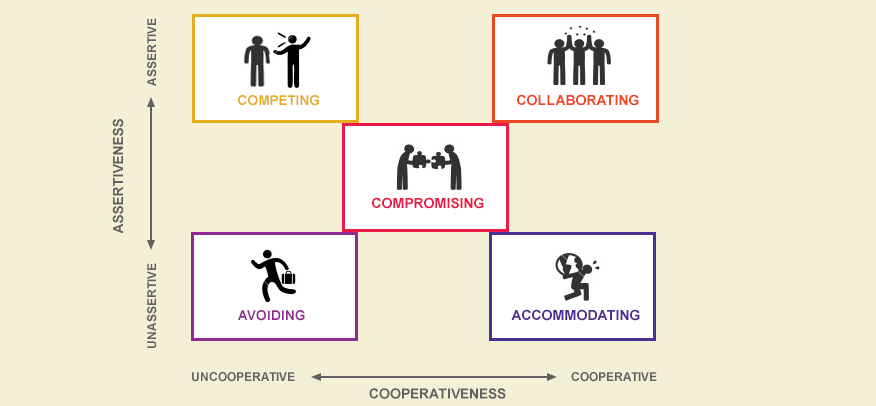I have had a super busy two weeks and have not had time to keep up with blogging.
I attended a working group with various stakeholders representing the taxi licensing for Amber Taxis, the main taxi firm in Leeds, to discuss different issues concerning the passengers. The discussion revolved around topics including taxi pick up points, cross-bordering (drivers from Bradford or Sheffield for example, working in Leeds) and training for the drivers. The members were interested to hear from the passenger group. There were only two equality hub representatives and we were both from the disability hub. The questions asked were mainly about disability awareness training, we were reassured that the drivers are due to receive a new set of trainings, the content of which was going to be discussed in the next working group. Sadly neither of us was able to attend this so it remains to be seen in the third meeting whether or not the programme proposed includes effective and detailed disability training. What was clear though was the inaccessibility of the meeting paperwork; we were handed out a large hard copy folder with lots of printed files. I mentioned that this format was not accessible for me and asked them to send me an electronic version of the files, sharing with them my contact details. Almost three weeks on this email has not arrived yet, even after another request send to the chair. I am not going to attend the third meeting if the paperwork is not sent to me electronically in advance of the meeting, because I feel I have been denied equal access to the paperwork and for that reason, I see little point in my participation in the meeting. The first meeting itself was intimidating enough; there were about 20 people present including some councillors and council officers. The meeting was dominated by the male members and women were generally not very vocal. It was challenging to speak out but I tried to talk about the difficulties I have faced when using taxies as clearly as I could. I am going to start documenting all the difficulties I face in future blogs, so we’ll see if anything changes!
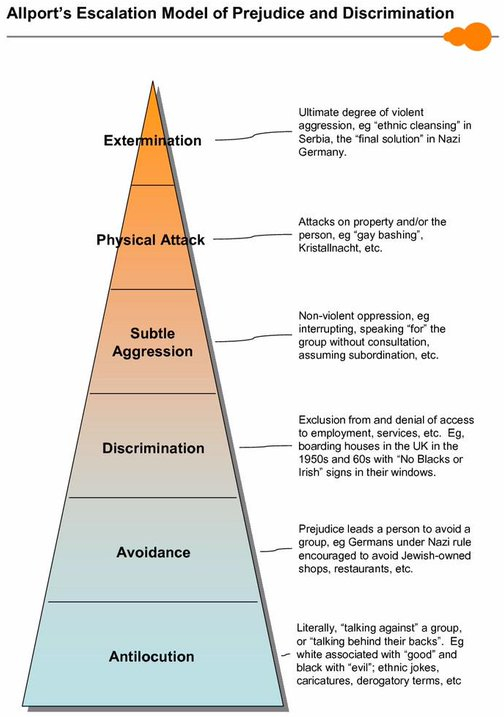
In the last two weeks, the Women for Peace course has been very interesting and informative. We explored ‘them’ and ‘us’ thinking, and how this narrative can be used by extremist groups to divide people, even to trigger violence. To examine this, we looked at the 22 Factors of Vulnerability, covering engagement such as feelings of grievance or injustice, a desire for status, being at a transitional time of life; intent such as over-identification and ‘them and us’ thinking; and capability, such as knowledge and access to networks and resources. These are some of the factors that can be used to assess whether someone might be on the path to terrorism (although this in itself is by no means evidence to criminalise anyone). This lead us to the exploration of Gordon Allport’s Nature of Prejudice Model, starting with anti-locution (negative words and comments about a group), then avoidance, then active discrimination against them (not employing people from that group), before physical violence and then ultimately extermination. This model brought home for me far right disablist groups, who spread bigotry against disabled people and promote disability hate crime or even extermination. The ‘us’ and ‘them’ way of thinking is relevant to disabled people’s life, where we are marginalised, excluded and not fully accommodated even in well meaning causes. Sadly the Women for Peace group does not seem to be interested in focusing on disabled people’s oppression, despite my attempts to bring up the topic wherever I can.
We then discussed the linear route suggested by an Iranian sociologist Moghaddam – ‘Staircase to Terrorism’ – as the path someone might take to carrying out an act of terror. The model highlights the implications of a single story narrative, and how a person can isolate themselves into becoming trapped in that mindset. I personally felt Moghaddam’s model was too linear and somewhat simplistic, not necessarily allowing room for the influence and interaction of multiple variables in an individual’s life.
We have also been watching ‘My Former Life’ over the last two weeks, and heard about the childhood experiences of four former extremists, ranging from psychological abuse to being bullied, how they each ended up joining an extremist group and what their turning points from those groups were. In small groups we then looked at each of the characters, and considered how life is for them now and how much they have recovered. I felt the turning point for all four characters was the recognition of human connectivity and the sense of our unity as human beings through the revaluation of their values, whether it was because they were overcome by a major sense of guilt or it was because they were touched by other’s kindness, words and actions.
Outside of the Women for Peace course, I attended a First Aid at Work course at the Centre for Integrated Living. Considering I have a team of six PAs, I felt it was important to know what to do should an emergency situation arise. The course was extremely informative and I learned a lot but it was very intense. In terms of accessibility, I was confronted with a number of challenges. Lots of example scenarios were very visual with little audio description; even the course handout was not fully accessible. The one to one attention that you would expect to be given to a disabled person attending a First Aid course to demonstrate the life support techniques was lacking. Despite all these barriers, I spent a full weekend revising for the exam, only to arrive on the Monday morning and to be told by the trainer that the head of the region had decided to award me only an attendance certificate instead of certificate of achievement, and that I did not need to take the exam.
While at first the internalised oppression kicked in and I said ‘I understand as I am not an ideal candidate for the first aid’, I immediately knew this was discriminatory, so I started the bargaining process. I challenged the trainer on taking at least the theory test, and then expressing my desire to take the practical one as well. He referred the request to the assessor, who was due to arrive later in the day, and while he did that, I rang David, who is on annual leave this week. I was demotivated, but determined to take the exam and David was happy to scribe the exam paper for me and also be my body buddy for the practical exam. I dictated my answers to David and once the assessor arrived I did the practical test. To my delight, the assessor was unsure as to why I should not receive the full certificate; she thought I performed well in both exams. I personally felt I could have done much better if I was not made to feel excluded from the examination process in the morning and thus discouraged. Nevertheless, I am pleased for challenging the trainer and showing that I am capable of partaking in the exam, It remains to be seen if I receive the full certificate or not, but that’s not the point. I’m also going to raise this with CIL as part of the feedback.
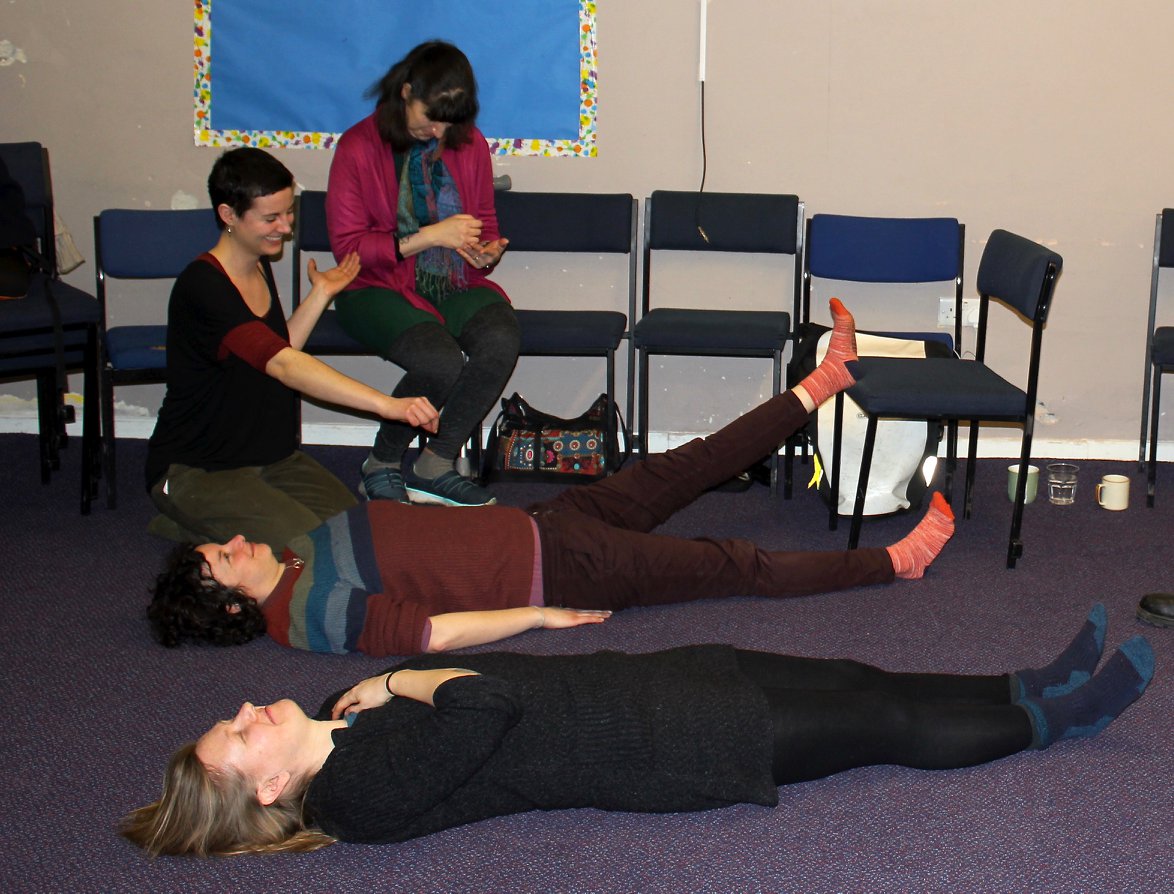
If all that wasn’t enough, I also participated in a weekend long workshop on the Theatre of the Oppressed (TotO) organised by Reboot the Roots and Leeds Tidal. This school of theatre-making, using a methodology underpinned by an ethos of empowerment, offers theatre as a tool for liberation to people in all stages of life in all parts of the world. It is a means of using theatre as a way of better understanding ourselves and how we fit into the worlds around us, and most importantly, how we might consequently change those worlds. It is a concrete embodiment of the arts as a real instrument for social and political change. The Theatre of the Oppressed is the remarkable invention of Augusto Boal, the Brazilian theatre-maker, theorist and activist.
We started the weekend with some specific exercises like Clay-modelling. We arranged ourselves in two lines of sculptures and statues facing each other. In the first round the sculptors were asked to mould their statues to objects while in the second round the sculptors were invited to mould an emotion. Then we were divided into small groups and given the task of representing a social issue in a statue form. Next we were told the name of a specific location in our teams and asked to display the place by using our bodies or body parts without talking to each other. Through creative techniques such as Image Theatre, Rainbow of Desires and Forum Theatre, we explored various oppressions.
Forum theatre is one tool of the Theatre of the Oppressed for enabling people to change their world. The objective of forum theatre is to transform passive spectators into active spect-actors through the presentation of a piece of theatre where a protagonist experiences an oppression – a situation where they fail to achieve what they want, or are prevented from doing so by the antagonists. We used the forum theatre for the most of the weekend. On the Saturday I volunteered to lead a group of four to perform out a disability discrimination scene.
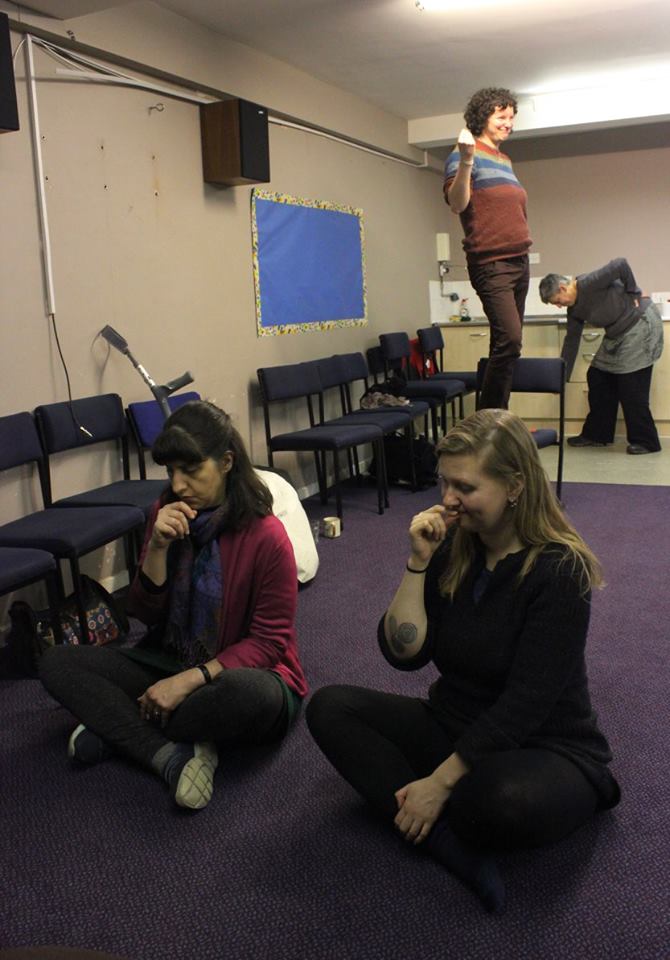 Firstly, we presented an anti-model: a short play where I as the protagonist tried and failed to break my oppression of being ignored and excluded, sitting on my own in a group with two chairs empty either side of me, and feeling lonely. The others were sitting together and talking patronisingly about the protagonist saying things like ‘poor thing, how does she manage’. Next, the Joker (the TotO facilitator) explained that the model will be replayed, but this time whenever the audience sees a moment the antagonists can act differently, they can shout out ‘stop!’ and once the audience member shouts stop, they are invited onstage to replace one of the antagonists and improvise their solution to the problem. The audience tried to replace different antagonists for a few rounds but none of their attempts to include the protagonist came across as natural. In the last round, I was asked to adopt an alternative approach as the protagonist, which I did. Instead of just sitting there, I made the proactive effort to be involved, such as saying hello and inviting the others in the group to come sit next to me.
Firstly, we presented an anti-model: a short play where I as the protagonist tried and failed to break my oppression of being ignored and excluded, sitting on my own in a group with two chairs empty either side of me, and feeling lonely. The others were sitting together and talking patronisingly about the protagonist saying things like ‘poor thing, how does she manage’. Next, the Joker (the TotO facilitator) explained that the model will be replayed, but this time whenever the audience sees a moment the antagonists can act differently, they can shout out ‘stop!’ and once the audience member shouts stop, they are invited onstage to replace one of the antagonists and improvise their solution to the problem. The audience tried to replace different antagonists for a few rounds but none of their attempts to include the protagonist came across as natural. In the last round, I was asked to adopt an alternative approach as the protagonist, which I did. Instead of just sitting there, I made the proactive effort to be involved, such as saying hello and inviting the others in the group to come sit next to me.
While the outcome was desirable and created a more inclusive environment, I felt it should not be down to me alone to put in all of the effort of making people feel comfortable, as this is something that I do most of the time. This in its way reinforces the oppression by not addressing the root of the problem and everyone agreed. Although the participants were clued-up and informed people, they all found the exercise helpful particularly as it was a direct reflection of a disabled person’s experiences, something that they were not so exposed to. Even though in the end we did not find an ideal solution and we did not break the oppression, I felt empowered having shared my daily disabling experiences with a receptive audience, who were willing to learn and look for solutions. I feel TotO has a great potential of raising awareness of social justice issues and involving the community; I would love to build on what I learned last weekend and do similar scenes reflecting the oppression of disabled people as a means of education. I remain hopeful that some opportunities will be opened in this direction.
It has been busy but steady in the healing centre for the last two Fridays and we have welcomed some old and new visitors to our new location, however throughout these busy days, I experienced a terrible migraine. This made me very sick but I was determined to stick it out and stay for all the events as it is important for me to participate in community activities, where I have chance to be ‘me’, meet new people and learn. I’m having a slight rest this week, readying myself for the work ahead, and I’m off up to the Left Bank Centre in Leeds this afternoon for some community bonding over cake and tea! Hopefully it’s vegan!
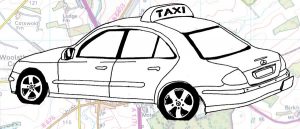
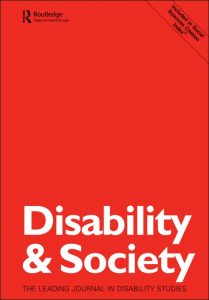 The highlight of this week was to see my article in print in the current issue of Disability and Society. It is important for me to tell my story of the Armenian academic trip in which I gave lectures and workshops while only relying on my wonderfully supportive parents. I hope my point was clear that it should not be down to my aging parents to provide support in that specific context rather academic mobility should be the norm for disabled researchers as it is for non-disabled scholars, and the academic community should be inclusive and accessible to all.
The highlight of this week was to see my article in print in the current issue of Disability and Society. It is important for me to tell my story of the Armenian academic trip in which I gave lectures and workshops while only relying on my wonderfully supportive parents. I hope my point was clear that it should not be down to my aging parents to provide support in that specific context rather academic mobility should be the norm for disabled researchers as it is for non-disabled scholars, and the academic community should be inclusive and accessible to all.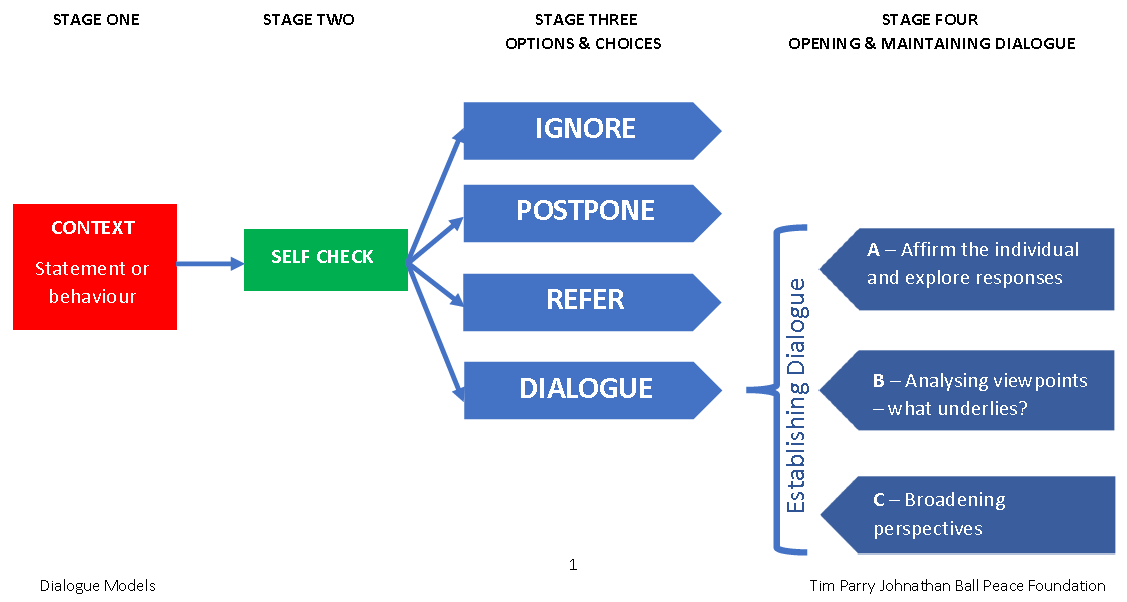 The Dialogue model is a useful way to address a comment that a person has made that we don’t feel comfortable with like a disablist comment/opinion. The model follows four stages of ignore, postpone, refer or dialogue in order to take us through a constructive dialogue about a topic. The ‘I’ Statements, on the other hand, are based on a non-judgemental model, where the person simply expresses how a certain conflict has made her feel and invites the other person to have a constructive discussion. I preferred the latter as it’s more about owning up to how one feels and taking responsibility for it instead of blaming the other. Following this, we came up with some conflict scenarios from personal experience in small groups. We then sat in two lines to do role plays with those topics, using our new dialogue models as tools to resolve the conflicts. I chose to use the statement ‘You don’t look blind’ for my scenario, which is often expressed in a complimentary way, however this is not received in the same way, at least by me. While the person role playing my scenario did not appear to realise the importance of ‘blind’ identity to my personhood, when acting out, I think the group understood the message.
The Dialogue model is a useful way to address a comment that a person has made that we don’t feel comfortable with like a disablist comment/opinion. The model follows four stages of ignore, postpone, refer or dialogue in order to take us through a constructive dialogue about a topic. The ‘I’ Statements, on the other hand, are based on a non-judgemental model, where the person simply expresses how a certain conflict has made her feel and invites the other person to have a constructive discussion. I preferred the latter as it’s more about owning up to how one feels and taking responsibility for it instead of blaming the other. Following this, we came up with some conflict scenarios from personal experience in small groups. We then sat in two lines to do role plays with those topics, using our new dialogue models as tools to resolve the conflicts. I chose to use the statement ‘You don’t look blind’ for my scenario, which is often expressed in a complimentary way, however this is not received in the same way, at least by me. While the person role playing my scenario did not appear to realise the importance of ‘blind’ identity to my personhood, when acting out, I think the group understood the message.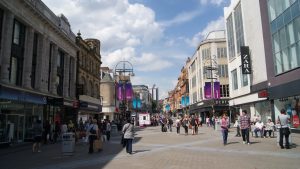 Outside the course, I participated in a focus group with some other equality hub members about how to make Leeds city centre more accessible. We had interesting ideas about the things we liked about Leeds and the things we didn’t like. From my perspective, I like open spaces such as Briggate and its pedestrian zone, and what I don’t like is the narrow pavements, especially when people leave their black, green and brown bins blocking the path. We also spoke of an ideal Leeds and what we would like to see. Recommendations included more lighting and safe spaces, audio signs and information (including bus/train timetables) and wider pavements. All in all it was a productive session for us, but much depends on how much is taken on board by the council when planning a more accessible Leeds.
Outside the course, I participated in a focus group with some other equality hub members about how to make Leeds city centre more accessible. We had interesting ideas about the things we liked about Leeds and the things we didn’t like. From my perspective, I like open spaces such as Briggate and its pedestrian zone, and what I don’t like is the narrow pavements, especially when people leave their black, green and brown bins blocking the path. We also spoke of an ideal Leeds and what we would like to see. Recommendations included more lighting and safe spaces, audio signs and information (including bus/train timetables) and wider pavements. All in all it was a productive session for us, but much depends on how much is taken on board by the council when planning a more accessible Leeds.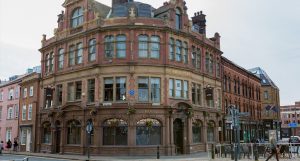 For the second time, David and I went to the historical talks held in
For the second time, David and I went to the historical talks held in 

 Firstly, we presented an anti-model: a short play where I as the protagonist tried and failed to break my oppression of being ignored and excluded, sitting on my own in a group with two chairs empty either side of me, and feeling lonely. The others were sitting together and talking patronisingly about the protagonist saying things like ‘poor thing, how does she manage’. Next, the Joker (the TotO facilitator) explained that the model will be replayed, but this time whenever the audience sees a moment the antagonists can act differently, they can shout out ‘stop!’ and once the audience member shouts stop, they are invited onstage to replace one of the antagonists and improvise their solution to the problem. The audience tried to replace different antagonists for a few rounds but none of their attempts to include the protagonist came across as natural. In the last round, I was asked to adopt an alternative approach as the protagonist, which I did. Instead of just sitting there, I made the proactive effort to be involved, such as saying hello and inviting the others in the group to come sit next to me.
Firstly, we presented an anti-model: a short play where I as the protagonist tried and failed to break my oppression of being ignored and excluded, sitting on my own in a group with two chairs empty either side of me, and feeling lonely. The others were sitting together and talking patronisingly about the protagonist saying things like ‘poor thing, how does she manage’. Next, the Joker (the TotO facilitator) explained that the model will be replayed, but this time whenever the audience sees a moment the antagonists can act differently, they can shout out ‘stop!’ and once the audience member shouts stop, they are invited onstage to replace one of the antagonists and improvise their solution to the problem. The audience tried to replace different antagonists for a few rounds but none of their attempts to include the protagonist came across as natural. In the last round, I was asked to adopt an alternative approach as the protagonist, which I did. Instead of just sitting there, I made the proactive effort to be involved, such as saying hello and inviting the others in the group to come sit next to me.